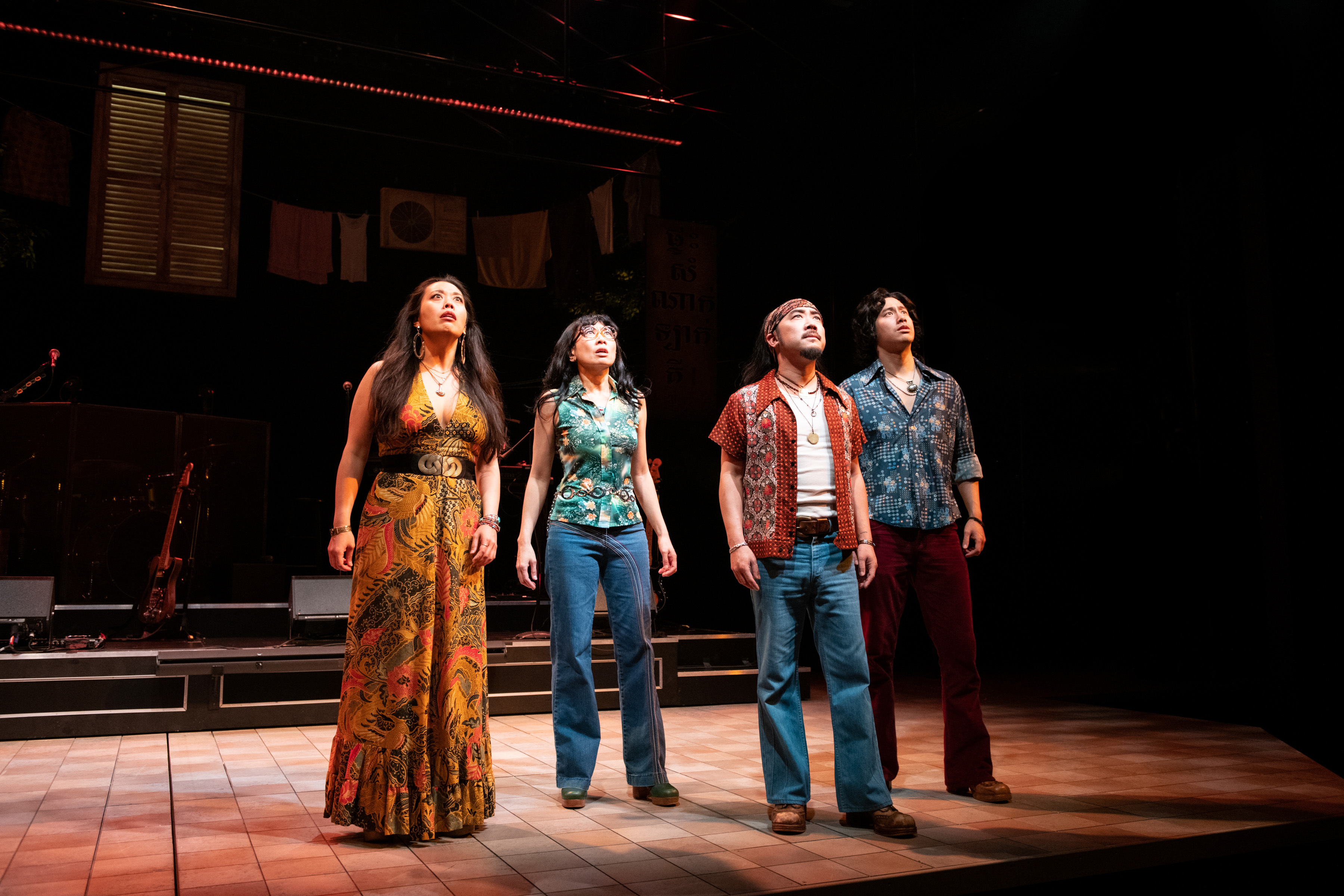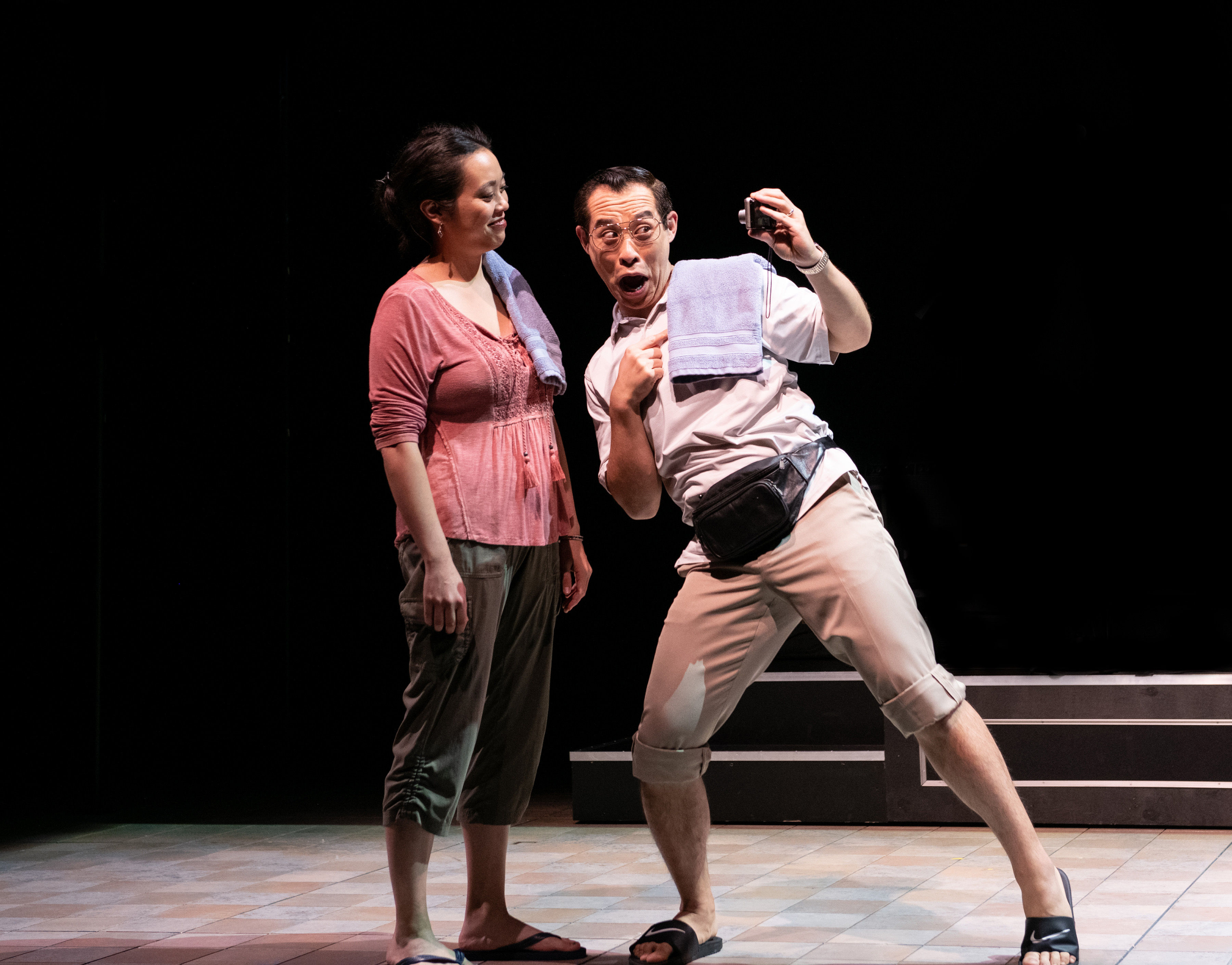Cambodian Rock Band Captures the Soul of Cambodia
Review of Cambodian Rock Band at ACT Theatre
Written by TeenTix Newsroom Writer Indigo Mays and edited by Teen Editorial Staff Member Daphne Bunker

The best way to capture my experience at Cambodian Rock Band, playing at ACT Theatre from September 29 to November 5, was the elderly woman who sat two spots down from me. As we all came back to our seats at the end of intermission, a ginormous version of the Cambodian flag during the period of Khmer Rouge was draped over the small stage. The red stage lights lit up the flag in a way that made it appear bloody and threatening, and the entire fifteen-minute intermission took place over a recording of uniform military marching, immersing the audience in a fear of the looming Khmer Rouge. As we tried to make small talk, a small elderly woman offered us lumpia out of a bag she had brought into the theater, for, I presume, her grandson. Separated by a language barrier and a general principle of not accepting food from strangers, I politely declined, but my friend, who was hungry, eagerly took one. The smell of fried crunchy carbs overwhelmed me and I also took one. We showed our appreciation the best we could before the lights started to dim again and the show unpaused. What is true to both the play and reality is that even in the brutal conditions and mere threat of the Khmer Rouge, the soul and spirit of the Cambodian people went undeterred.

Cambodian Rock Band, written by Lauren Yee and directed by Chay Yew, tells the story of former musician Chum, through the narration of both Chum himself and the cynical war criminal, Duch. The story starts when Chum returns to Cambodia for the first time since the regime of Pol Pot to convince his American daughter, Neary, to drop her case against Duch, the prison manager of the infamously lethal S-21, and become a lawyer in the U.S. After finding out her father is the eighth survivor of S-21 and her key to indicting Duch, Neary and Chum have a huge fight over victimhood, assimilation, and accountability, leading Neary to disappear. Over voicemail, Chum jumps back in time to explain to his daughter the plights, pride, and nuanced events of his youth.
The intimate three-quarter stage makes an already intimate play, which is full of direct interactions with the audience and a non-linear story, even more personal. Played by Vi Tran, Duch appropriately commands the attention of the audience, often in snide remarks and nihilistic quips. He uses the small stage to his advantage, seeming to speak directly to us onlookers. There is a gravity to his presence that demands the audience’s fear even before it is revealed that he is a war criminal. The breaking of the fourth wall and tampering with truth is a staple of the postmodern play genre; Duch’s character solidifies this as a walking contradiction to the idea that truth is immutable. It is Duch who decides what is and isn’t true in this play, going even so far as to pull out the western rock staple of a Stratocaster from the grounds of an anti-western communist prison cell. Duch chooses when to simplify the harsh realities of Khmer Rouge Cambodia, and gets called out by Chum for this hypocrisy. The play is incredibly aware of the nuances of truth, something vital surrounding the history of the Khmer Rouge. These notes of fallacy dance with the trueness of Duch’s character, who was a real person who ran the S-21 prison and got sentenced to life in prison in a 2008 trial.

The production takes many other steps to ground the play in historical truth despite the fabricated plotline, such as, and most importantly, the music. Cambodian classics like “Jeas Cyclo” originally by Yol Aularong, at times make the play feel like a rock concert with dramatic interludes. The actors, who sing and play instruments live during the music breaks, bring the music to life. Brooke Ishibashi, who plays both Sothea and Neary, has a mystifyingly beautiful voice. As she sings, she gazes into the audience with a demanding stature. Casting such a talented artist in the role honors the legacy of Ros Serey Sothea, a popular Cambodian singer who disappeared during the Khmer Rouge regime. It also shows the writer's dedication to creating a distinctly Cambodian experience, rooted in the country’s heritage. Picking music with Khmer lyrics made the production distinctly Cambodian and added a level of authenticity. During many of the songs, the Khmer elders in the crowd danced in their seats.
The many credits of the small but decorated cast, like Everything, Everywhere, All at Once, and Into the Woods, speak to the breadth of talent showcased in the production. Chum's actor, Joe Ngo, helped to create the character alongside Lauren Yee and is in the play’s dedication. Ngo’s commitment to the role can be seen in the seamless transitions between flashback Chum and current Chum, like when switching from an American accent during his past, to a rough Cambodian accent in the present. At one point in the play, he wears the makeup and costume of his present but plays the part of past Chum so well, voice full of naīvety and charisma, that no confusion surrounds the sudden change. Brooke Ishibashi plays both the roles of Neary, Chum’s daughter, and Sothea, Chum’s bandmate. The choice to double cast was made by the playwright Yee, expertly juxtaposing the stressed, second-gen character of Neary with the charming hippie nature of Sothea.
This production has something for everyone: an intimate venue, an amazing cast, historical significance, banger music, and a genuine sense of community. Cambodian Rock Band seeks to define what truth is on a familial, historical, and national level and does so cleverly and entertainingly. This play is amazing, and on a more impactful level, tells a piece of history often overlooked and undeveloped, without losing the soul and spirit of its story.
Lead Photo Credit: Abraham Kim, Joe Ngo, Brooke Ishibashi, Jane Lui, and Tim Liu in Cambodian Rock Band at Arena Stage at the Mead Center for American Theater. Photo by Margot Schulman.
The TeenTix Newsroom is a group of teen writers led by the Teen Editorial Staff. For each review, Newsroom writers work individually with a teen editor to polish their writing for publication. The Teen Editorial Staff is made up of 5 teens who curate the review portion of the TeenTix blog. More information about the Teen Editorial Staff can be found HERE.
The TeenTix Press Corps promotes critical thinking, communication, and information literacy through criticism and journalism practice for teens. For more information about the Press Corps program see HERE.

